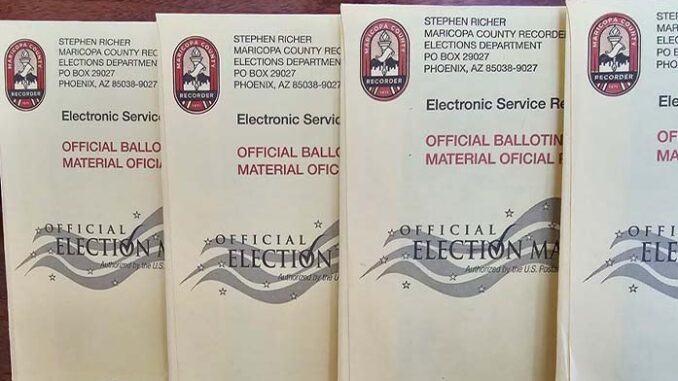
As soon as the ballots for the November bond and override elections reached Maricopa County homes, social media began filling up with images of ballots received in error. The ballots in question, according to the social media posters, arrived at their residences for voters who had long ago moved on.
Each election cycle, these same type of reports and pictures raise the same questions: how is it that our voter rolls are filled with so many errors, and how many ballots are delivered in error?
.@stephen_richer, this family got more ballots than there are voters at their residence. Hopefully, the voter rolls will be cleaned up amd ready for 2024! 🧹 pic.twitter.com/pOt6ACMU6o
— Arizona Women of Action (@azwomenofaction) October 16, 2023
The significant number of ballots arriving at addresses where the addressees have not lived in years has also raised a red flag among voters concerned about the misuse of mailed ballots by unscrupulous individuals. Generally according to experts, those ballots are never seen on social media, but do often make their way back to ballot boxes and may or may not be counted depending on the integrity of county-level ballot processing.
Experts say they have no choice but to send ballots out to all registered voters and it is almost impossible to remove a voter from the rolls.
Maricopa County Recorder Stephen Richer says despite the obstacles, he is doing everything within his power to make sure voter rolls are accurate and up to date, but federal regulations and concerns about disenfranchisement have his hands pretty much tied.
“When I took office on January 4, 2021, Maricopa County had about 2.6 million active registered voters. We now have about 2.5 million active registered voters. We’ve gone down 100,000 despite being the fastest growing county in the United States,” Richer told the Arizona Daily Independent. “That is because we have used never before-run National Change of Address (NCOA) reports, reports from the Electronic Registration Information Center (ERIC), we’ve implemented spot-check audits, and we’ve benefitted from the redistricting mailings. And more! We’ve done all of this in compliance of both state and federal law – both of which strictly limit when a voter can be moved to inactive status.”
Mr. Richer attributed most of the recent concerns to a lack of understanding of how the system works, “Regarding the ongoing jurisdictional elections, we’ve mailed out 1,923,672 mail ballot packets. For these jurisdictional elections, every eligible voter receives a ballot by mail, even if he is not on the Active Early Voting List (AEVL). This is something some people online have unfortunately misunderstood. For example, Brian Ference, a member of the Maricopa County Republican Committee Executive Board wrote, “I said I didn’t want a mail ballot. I wanted to vote in person. I STILL got a ballot. Arizona is a broken election state.”
He also expressed a desire to have voters assist with the process.
“From the 1,923,672 mail ballot packets that went out, we have received very few official inquiries or concerns. Only a handful in fact. Voters can write to voterinfo@risc.maricopa.gov or can call our call center at 602-506-1511. Additionally, if any household receives a ballot packet for somebody who no longer resides at the house, the household can mark the box at the top of yellow delivery envelope (“If the addressee does not reside at this address, mark the box and return it to the U.S. Postal Service.”)”
Mr. Richer closed his explanation with the following reminder, “Remember, we are not allowed to cancel a voter just because that voter moved or hasn’t voted in a while.”
Richer reminded voters that they can cancel their registration by filling out this form and remitting it: here
“Households should be encouraged to take the name of the voter (maybe take a picture of the envelope mailed to them), check the box saying the voter named no longer lives at the address, possibly report the voter info to the AZGOP, who should watch the daily returns and if that ballot gets voted, the AZGOP should submit a written challenge to the early vote as provided by law,” election expert Jennifer Wright told the Arizona Daily Independent.
